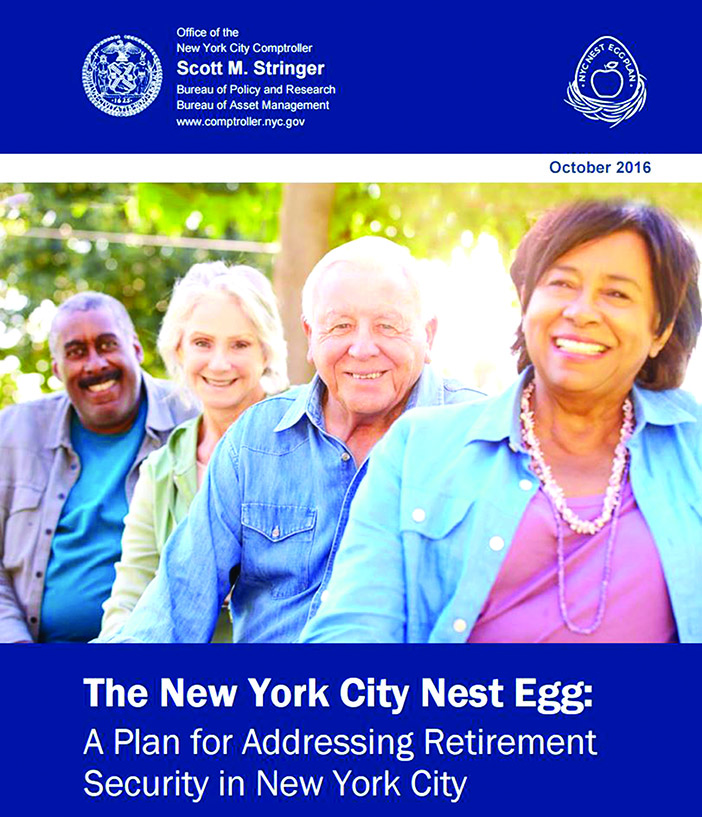By Forum Staff
City Comptroller Scott Stringer has released a new plan that, he said, takes an innovative, market-driven approach to providing private–sector employees access to a retirement plan at their workplace.
The “New York City Nest Egg” retirement program was developed after 19 months of consultation with the Comptroller’s Retirement Security Study Group, a team that features the nation’s top academics in pension policy.
“The plan we are releasing today offers the best chance to protect hundreds of thousands of New Yorkers who would otherwise face retirement struggling to pay rent, cover medical bills, or put food on the table, especially now that retirement could last 20 or 30 years,” Stringer said. “Today, 58 percent of private sector workers in New York City have no access to a retirement plan at work – and for those at companies with fewer than 10 employees, that number jumps to 89 percent. Unless we act now, what should be the golden years in America’s largest city may well become the darkest years for too many people and a burden for future taxpayers who would be called upon to support a growing population of low-income seniors.”
The Nest Egg proposal, according to Stringer, is designed to mitigate liability concerns for taxpayers and employers. The City would be under no obligation nor would it commit to fund any losses experienced by investors in the normal course of operations. Additionally, for those employers who already provide a retirement plan, the new program requires no action. But for those who don’t, the Nest Egg “provides a comprehensive, flexible approach,” Stringer said, based on three key components:
The NYC 401(k) Marketplace: A new, voluntary exchange overseen by an independent board that would offer employers a choice of screened, competing 401(k) and other retirement plans from private and public providers.
The Marketplace would save employers time and money by providing ready access to a “curated” pool of acceptable, easier-to-use 401(k) “prototype” plans and IRA options, Stringer noted. By establishing minimum eligibility criteria, offering more than one 401(k) plan, and employing the power of competition, the Marketplace could help provide quality products at a lower price and meet the needs of employees who seek to save more for retirement.
The Empire City 401(k) – One option available through the Marketplace would be the new Empire City 401(k), Stringer said, the first formal proposal in the nation to take advantage of recent changes in federal law allowing multiple employers who are unaffiliated to join a single, publicly-sponsored 401(k) plan.
This arrangement removes a major obstacle for small employers, the comptroller noted, by allowing them to offer a cost-effective 401(k) plan to their employees without being encumbered by complicated regulatory requirements under Employee Retirement Income Security Act, the federal law governing private pension plans. An independent governance board would be an ERISA fiduciary for the plan.
NYC Roth IRA – For all private-sector employers who choose not to shop through the exchange or select a plan through other methods, Stringer said, this plan serves as the required default option. Research shows that automatic enrollment in retirement savings accounts vastly improves participation, so employers would be required to automatically enroll eligible employees (although, as with all Nest Egg plans, employees would be free to opt out at any time).
The federal myRA plan would be the automatic investment option for the first $15,000 in savings, with no fees and a guarantee of no loss of principal to those who invest – another first in the nation among proposed city and state plans – which will help lower costs.
According to the Comptroller’s Office, the NYC Nest Egg plan would be overseen by an independent board of experts whose responsibility would be to protect the best interests of participants. The board would periodically select investment management, administrative, and education providers through a transparent competitive bidding process. In addition to the myRA, investment options would be limited to a set of passively managed low-cost index funds.
“Today, too many New Yorkers face a bleak economic future, with Social Security providing only basic protection, because they have little or no real savings to rely on in their retirement years,” Stringer said. “That’s why I’m proposing the NYC Nest Egg Retirement program, an initiative that expands the retirement safety net in our City – without creating any additional liability for taxpayers. We cannot afford to wait another day to tackle this critical challenge – not if we want to keep New York a place where people can look forward to retiring securely after a lifetime of work and sacrifice.”

